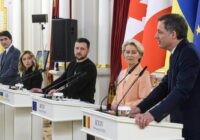The BRICS summit in Kazan, chaired by Russia from October 22–24, 2024, has drawn great international attention. After all, it conveys many messages in the current and future geopolitical contexts.
The West has tried to isolate Russia internationally, defeat it militarily and, through an array of draconian sanctions, cause its economic collapse. It has met none of these objectives.
Russia’s connections with China have deepened strategically. India has preserved its strategic ties with Moscow despite Western pressure. Russian relations with several African countries also have a new momentum. Moscow is strongly present in the West Asia region and has a close relationship with key Arab countries. Its partnership with some Association of Southeast Asian Nations (ASEAN) countries is gaining steam, too.
BRICS’s expansion
The expansion of BRICS in 2023 with Egypt, United Arab Emirates, Iran, Ethiopia and Saudi Arabia had already signaled that major countries in the Global South had a very different perspective on Russia than the West did. It sees Russia as a friendly country, not an adversary. That almost 40 countries have shown interest in joining BRICS, a forum in which Moscow plays a key role, signifies that Russia is an attractive partner to them.
The Global South seeks a reformed international system that would reflect the shifts in power equations away from the West, both economic and political, that have occurred over the years. These countries want more attention to be paid to their concerns and priorities.
The West’s hypocritical double standards regarding its “values-based” policies, its military interventions, its use of various means to bring about regime changes, its use of sanctions as a policy tool, its weaponization of the United States dollar and the US’s global financial system have increasingly pushed non-Western countries to hedge themselves against Western pressures by joining forums such as BRICS. If Russia earlier looked westwards, the West has turned its back on Russia. Now Russia is much more focused on its Eurasian identity and is looking eastwards.
Non-Western countries cannot opt out of the existing international system or create one of their own. What they hope to do is to change the balance of power within the existing system and reform it to ensure more equality and equity in its functioning. The Global South countries, which also have close relations with the West, are being attracted to join BRICS or associate with it in order to increase their political, economic and security options.
The fact that 24 world leaders attended the Kazan summit, including those of five founding members and the four new permanent members, show that the West’s already failing efforts to isolate Russia and its president, Vladimir Putin, have been strongly rebuffed.
More members may bring complications
With so much interest in BRICS in the Global South, the question of expanding its membership and the criteria to do that pose difficulties. BRICS is a consensus-based forum. With the expansion, building a consensus on issues would become more difficult. That would affect the operation and credibility of the forum.
The meeting of the BRICS Foreign Ministers in June 2024 at Nizhny Novgorod in Russia, also attended by the four new members, could not issue a joint communiqué because of differences on certain points.
Putin has himself publicly recognized the downside to any further expansion. He noted that the existing members have worked together for years and know how the forum functions. The process of absorbing the new members into the methods and spirit of the forum will be the immediate focus, not its expansion.
The decision, therefore, has been not to broaden the BRICS membership for the moment but to enlarge its base by accepting new countries as partners. Developing a consensus within BRICS on which countries should be admitted as partners was presumably not an easy exercise; all the BRICS members, old and new, had effective veto rights. It had to be ensured that no member country was particularly advantaged by the choice of partners and that the final list reflected a balance between the preferences of the forum’s members.
A wide spread
The Kazan summit saw the acceptance of 13 new BRICS partners: Algeria, Belarus, Bolivia, Cuba, Indonesia, Kazakhstan, Malaysia, Nigeria, Thailand, Turkey, Uganda, Uzbekistan and Vietnam. It is significant that four members of the Association of Southeast Asian Nations (ASEAN) are also among these.
Algeria, much to its disappointment, could not become a member when BRICS expanded last year. It has now obtained partner status. Two key Central Asian countries (Kazakhstan and Uzbekistan) have become partners, too. Other Central Asian countries could obviously not be included as that would have weighed too much in favor of Russia’s interests. Already, the inclusion of Belarus is a clear Russian preference. The geographical spread of the new partner countries is noteworthy.
Russia’s obvious preference for Turkey was also accommodated given the latter’s geopolitical importance for Russia, even though giving partner status to a NATO country might not fit into any normal criteria for deciding BRICS partnerships. Should NATO get a foothold in BRICS? From the Russian point of view, this would be a welcome political development in NATO’s eastern flank. The US, which sees BRICS as an organization created to rival the West in the global system, would be obviously perturbed by Turkey’s decision.
Why Pakistan was kept away
It would seem that China has not exercised its own special geopolitical preferences too visibly. If it were interested in Pakistan’s inclusion, as it could well have been — it had linked India’s Shanghai Cooperation Organisation (SCO) membership with that of Pakistan — it would have run into India’s strong opposition. In September 2024, while visiting Pakistan, Russian Deputy Prime Minister Alexey Overchuk supported its inclusion in BRICS but stated that such a decision would have to be based on a consensus. India clearly scotched any move to reach out to Pakistan, to the point that Pakistan seemingly was not invited to the summit.
India had reservations about Turkey becoming a partner because of its anti-Indian positions on Kashmir in the United Nations General Assembly (UNGA) and in the Organisation of Islamic Cooperation (OIC). Ultimately, India did not stand in the way of Turkey becoming a BRICS partner.
The last BRICS summit approved the membership of Saudi Arabia, but it has not formally conveyed its acceptance. It was represented at the Kazan summit by its foreign minister. Saudi Crown Prince Mohammed bin Salman Al Saud received US Secretary of State Antony Blinken in Riyadh while the summit was being held in Kazan, which tells its own story.
Do not overestimate BRICS’s pace
The importance of BRICS’s expanded partnerships across Asia, Africa and Latin America should not be underestimated. It shows dissatisfaction with the current international system. Non-western countries want an end to the West’s hegemony. They suffer from the West’s self-centered, arbitrary policies. They see strengthened multilateralism reflected in multipolarity as the key to change.
At the same time, the pace at which BRICS can bring about this change should not be exaggerated. The goals of BRICS in forging alternatives to the dollar-dominated financial system are not easy to achieve. Within the BRICS countries, there are rivalries and divisions. Their political systems differ. Some are deeply anti-West. Others have friendly ties with the West even when they seek more space for themselves in a West-dominated global system. There are large economic disparities within the group. The policies of some both help and hurt the interests of the Global South.
When all is said and done, BRICS’s expansion, with all its challenges, is a vehicle for a much-needed re-balancing within the global system — something India also seeks.
[Lee Thompson-Kolar edited this piece.]
The views expressed in this article are the author’s own and do not necessarily reflect Fair Observer’s editorial policy.
Support Fair Observer
We rely on your support for our independence, diversity and quality.
For more than 10 years, Fair Observer has been free, fair and independent. No billionaire owns us, no advertisers control us. We are a reader-supported nonprofit. Unlike many other publications, we keep our content free for readers regardless of where they live or whether they can afford to pay. We have no paywalls and no ads.
In the post-truth era of fake news, echo chambers and filter bubbles, we publish a plurality of perspectives from around the world. Anyone can publish with us, but everyone goes through a rigorous editorial process. So, you get fact-checked, well-reasoned content instead of noise.
We publish 2,500+ voices from 90+ countries. We also conduct education and training programs
on subjects ranging from digital media and journalism to writing and critical thinking. This
doesn’t come cheap. Servers, editors, trainers and web developers cost
money.
Please consider supporting us on a regular basis as a recurring donor or a
sustaining member.
Will you support FO’s journalism?
We rely on your support for our independence, diversity and quality.










Comment